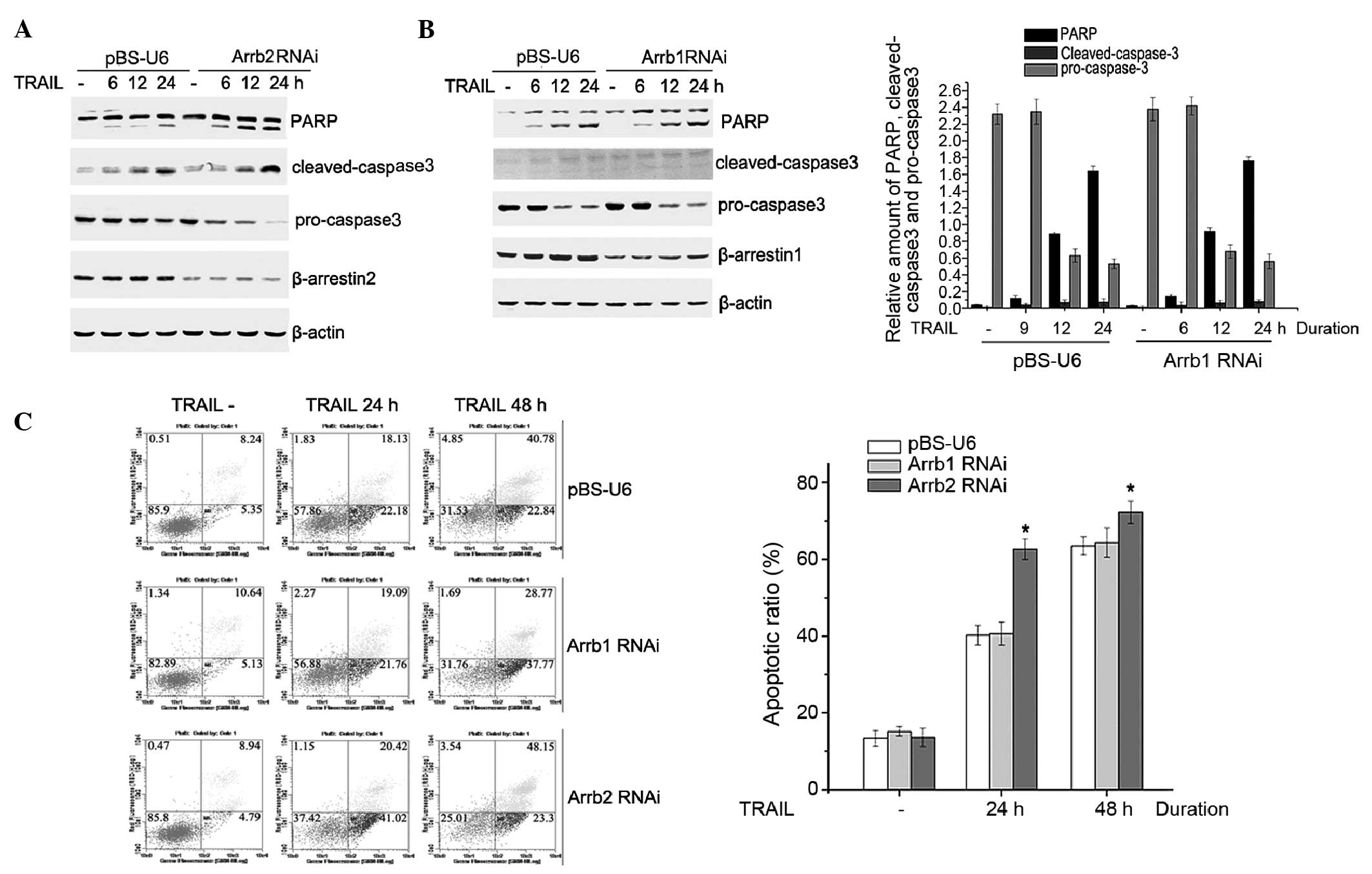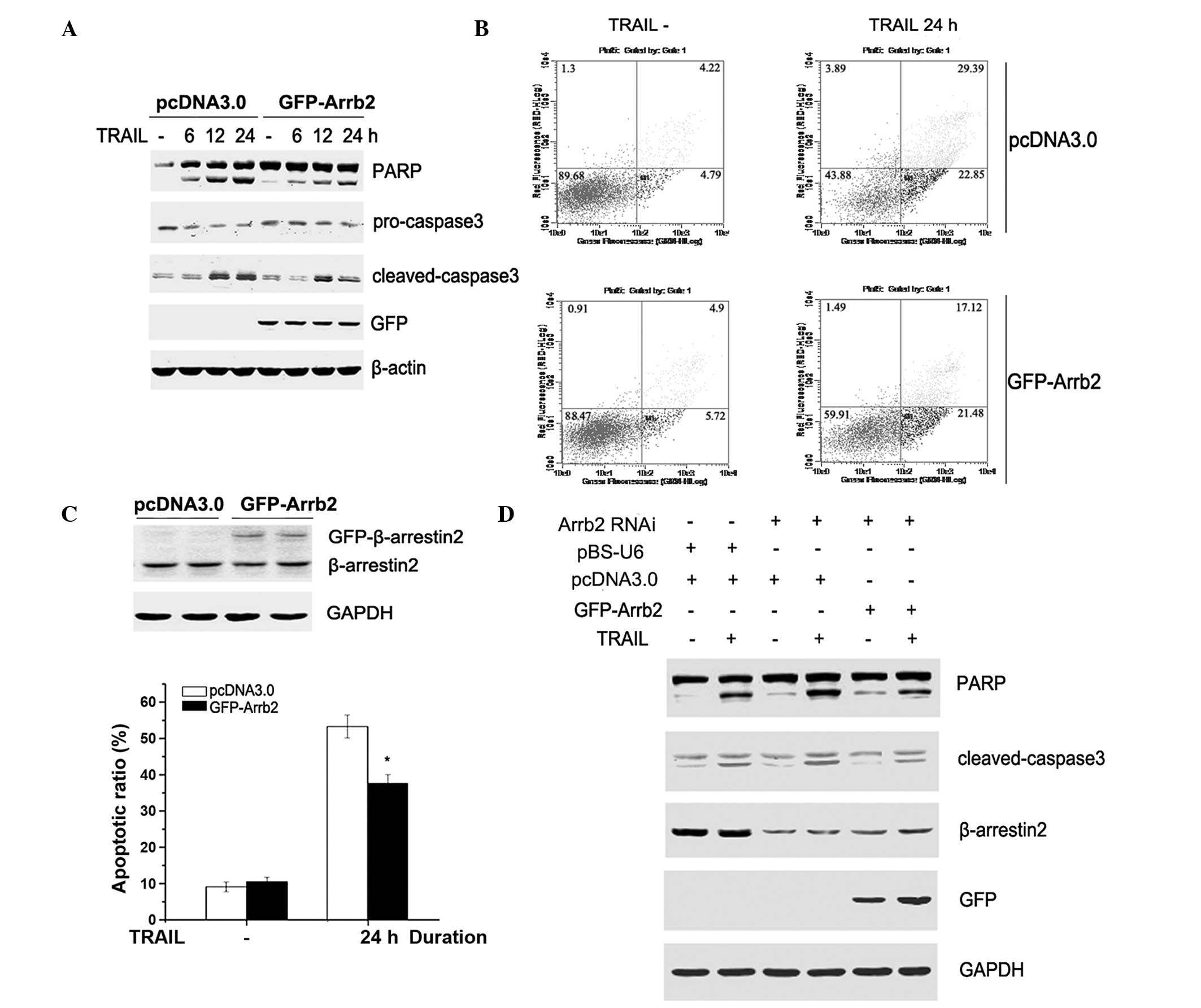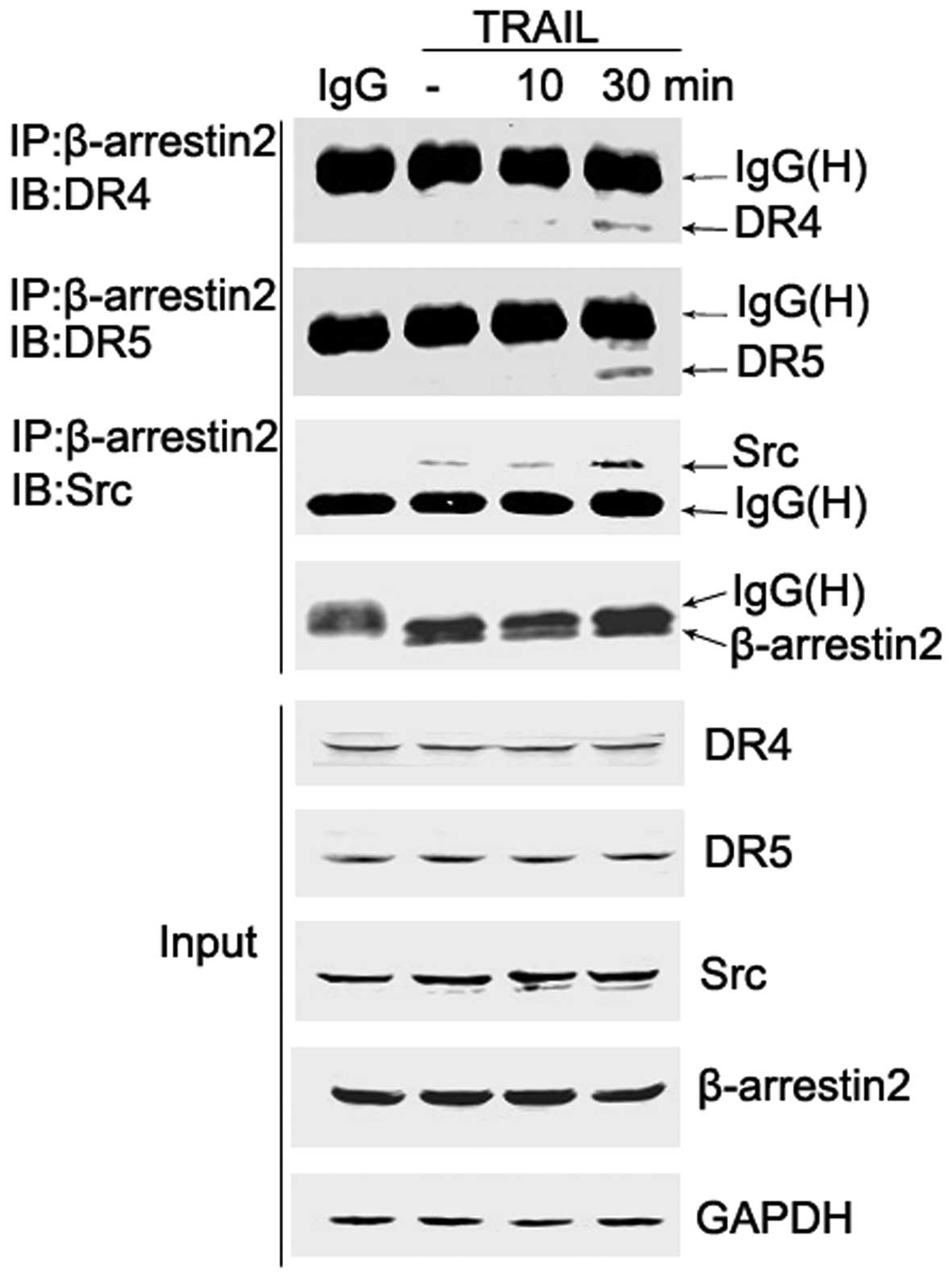|
1
|
Shenoy SK and Lefkowitz RJ:
β-Arrestin-mediated receptor trafficking and signal transduction.
Trends Pharmacol Sci. 32:521–533. 2011. View Article : Google Scholar : PubMed/NCBI
|
|
2
|
Violin JD and Lefkowitz RJ:
Beta-arrestin-biased ligands at seven-transmembrane receptors.
Trends Pharmacol Sci. 28:416–422. 2007. View Article : Google Scholar : PubMed/NCBI
|
|
3
|
DeFea KA: Beta-arrestins as regulators of
signal termination and transduction: How do they determine what to
scaffold? Cellular signalling. 23:621–629. 2011. View Article : Google Scholar
|
|
4
|
Yang X, Zhou G, Ren T, Li H, Zhang Y, Yin
D, Qian H and Li Q: β-Arrestin prevents cell apoptosis through
pro-apoptotic ERK1/2 and p38 MAPKs and anti-apoptotic Akt pathways.
Apoptosis. 17:1019–1026. 2012. View Article : Google Scholar : PubMed/NCBI
|
|
5
|
Zhang Z, Hao J, Zhao Z, Ben P, Fang F, Shi
L, Gao Y, Liu J, Wen C, Luo L and Yin Z: Beta-Arrestins facilitate
ubiquitin-dependent degradation of apoptosis signal-regulating
kinase 1 (ASK1) and attenuate H O 2009. 2 2-induced apoptosis. Cell
Signal. 21:1195–1206
|
|
6
|
Wang Y, Tang Y, Teng L, Wu Y, Zhao X and
Pei G: Association of beta-arrestin and TRAF6 negatively regulates
Toll-like receptor-interleukin 1 receptor signaling. Nat Immunol.
7:139–147. 2006. View
Article : Google Scholar
|
|
7
|
Hu S, Wang D, Wu J, Jin J, Wei W and Sun
W: Involvement of β-arrestins in cancer progression. Mol Biol Rep.
40:1065–1071. 2013. View Article : Google Scholar
|
|
8
|
Ahn S, Kim J, Hara MR, Ren XR and
Lefkowitz RJ: {beta}-Arrestin-2 mediates anti-apoptotic signaling
through regulation of BAD phosphorylation. J Biol Chem.
284:8855–8865. 2009. View Article : Google Scholar : PubMed/NCBI
|
|
9
|
Sun X, Zhang Y, Wang J, Wei L, Li H,
Hanley G, Zhao M, Li Y and Yin D: Beta-arrestin 2 modulates
resveratrol-induced apoptosis and regulation of Akt/GSK3β pathways.
Biochim Biophys Acta. 1800:912–918. 2010. View Article : Google Scholar : PubMed/NCBI
|
|
10
|
Wu GS: TRAIL as a target in anti-cancer
therapy. Cancer Lett. 285:1–5. 2009. View Article : Google Scholar : PubMed/NCBI
|
|
11
|
Moon DO, Park SY, Choi YH, Ahn JS and Kim
GY: Guggulsterone sensitizes hepatoma cells to TRAIL-induced
apoptosis through the induction of CHOP-dependent DR5: Involvement
of ROS-dependent ER-stress. Biochem Pharmacol. 82:1641–1650. 2011.
View Article : Google Scholar : PubMed/NCBI
|
|
12
|
Guo SY, Liu SG, Liu L, Zhou XJ and Gu Y:
RNAi silencing of the MEKK3 gene promotes TRAIL-induced apoptosis
in MCF-7 cells and suppresses the transcriptional activity of
NF-κB. Oncol Rep. 27:441–446. 2012.
|
|
13
|
Falschlehner C, Emmerich CH, Gerlach B and
Walczak H: TRAIL signalling: Decisions between life and death. Int
J Biochem Cell Biol. 39:1462–1475. 2007. View Article : Google Scholar : PubMed/NCBI
|
|
14
|
LeBlanc HN and Ashkenazi A: Apo2 L/TRAIL
and its death and decoy receptors. Cell Death Differ. 10:66–75.
2003. View Article : Google Scholar : PubMed/NCBI
|
|
15
|
Álvarez CJ, Lodeiro M, Theodoropoulou M,
Camiña JP, Casanueva FF and Pazos Y: Obestatin stimulates Akt
signalling in gastric cancer cells through beta-arrestin-mediated
epidermal growth factor receptor transactivation. Endocr Relat
Cancer. 16:599–611. 2009. View Article : Google Scholar : PubMed/NCBI
|
|
16
|
Im SR and Jang YJ: Aspirin enhances
TRAIL-induced apoptosis via regulation of ERK1/2 activation in
human cervical cancer cells. Biochem Biophys Res Commun. 424:65–70.
2012. View Article : Google Scholar : PubMed/NCBI
|
|
17
|
Zhao J, Lu Y and Shen HM: Targeting p53 as
a therapeutic strategy in sensitizing TRAIL-induced apoptosis in
cancer cells. Cancer Lett. 314:8–23. 2012. View Article : Google Scholar
|
|
18
|
Qi S, Xin Y, Qi Z, Xu Y, Diao Y, Lan L,
Luo L and Yin Z: HSP27 phosphorylation modulates TRAIL-induced
activation of Src-Akt/ERK signaling through interaction with
β-arrestin2. Cell Signal. 26:594–602. 2014. View Article : Google Scholar
|
|
19
|
Bareford MD, Hamed HA, Allegood J,
Cruickshanks N, Poklepovic A, Park MA, Ogretmen B, Spiegel S, Grant
S and Dent P: Sorafenib and pemetrexed toxicity in cancer cells is
mediated via SRC-ERK signaling. Cancer Biol Ther. 13:793–803. 2012.
View Article : Google Scholar : PubMed/NCBI
|
|
20
|
Park EJ, Chung HJ, Park HJ, Kim GD, Ahn YH
and Lee SK: Suppression of Src/ERK and GSK-3/β-catenin signaling by
pinosylvin inhibits the growth of human colorectal cancer cells.
Food Chem Toxicol. 55:424–433. 2013. View Article : Google Scholar : PubMed/NCBI
|
|
21
|
Pierce KL and Lefkowitz RJ: Classical and
new roles of beta-arrestins in the regulation of G-protein-coupled
receptors. Nat Rev Neurosci. 2:727–733. 2001. View Article : Google Scholar : PubMed/NCBI
|
|
22
|
Kook S, Gurevich VV and Gurevich EV:
Arrestins in apoptosis. Arrestins-Pharmacology and Therapeutic
Potential. Gurevich VV: 219. 1st edition. Springer-Verlag; Berlin,
Heidelberg: pp. 309–339. 2014, View Article : Google Scholar
|
|
23
|
Maksimovic-Ivanic D, Stosic-Grujicic S,
Nicoletti F and Mijatovic S: Resistance to TRAIL and how to
surmount it. Immunol Res. 52:157–168. 2012. View Article : Google Scholar : PubMed/NCBI
|
|
24
|
Kim SR, Jung YR, Kim DH, An HJ, Kim MK,
Kim ND and Chung HY: Caffeic acid regulates LPS-induced NF-κB
activation through NIK/IKK and c-Src/ERK signaling pathways in
endothelial cells. Arch Pharm Res. 37:539–547. 2014. View Article : Google Scholar
|
|
25
|
Kim JI, Lakshmikanthan V, Frilot N and
Daaka Y: Prostaglandin E2 promotes lung cancer cell migration via
EP4-βArrestin1-c-Src signalsome. Mol Cancer Res. 8:569–577. 2010.
View Article : Google Scholar : PubMed/NCBI
|
|
26
|
Dasgupta P, Rizwani W, Pillai S, Davis R,
Banerjee S, Hug K, Lloyd M, Coppola D, Haura E and Chellappan SP:
ARRB1-mediated regulation of E2F target genes in nicotine-induced
growth of lung tumors. J Natl Cancer Inst. 103:317–333. 2011.
View Article : Google Scholar : PubMed/NCBI
|
|
27
|
Kook S, Zhan X, Cleghorn WM, Benovic JL,
Gurevich VV and Gurevich EV: Caspase-cleaved arrestin-2 and BID
cooperatively facilitate cytochrome C release and cell death. Cell
Death Differ. 21:172–184. 2014. View Article : Google Scholar
|
|
28
|
Lodeiro M, Theodoropoulou M, Pardo M,
Casanueva FF and Camiña JP: C-Src regulates Akt signaling in
response to ghrelin via beta-arrestin signaling-independent
and-dependent mechanisms. PLoS One. 4:e46862009. View Article : Google Scholar
|
|
29
|
Marchese A, Chen C, Kim YM and Benovic JL:
The ins and outs of G protein-coupled receptor trafficking. Trends
Biochem Sci. 28:369–376. 2003. View Article : Google Scholar : PubMed/NCBI
|
|
30
|
Laporte SA, Oakley RH, Holt JA, Barak LS
and Caron MG: The interaction of beta-arrestin with the AP-2
adaptor is required for the clustering of beta 2-adrenergic
receptor into clathrin-coated pits. J Biol Chem. 275:23120–23126.
2000. View Article : Google Scholar : PubMed/NCBI
|
|
31
|
Prossnitz ER: Novel roles for arrestins in
the post-endocytic trafficking of G protein-coupled receptors. Life
Sci. 75:893–899. 2004. View Article : Google Scholar : PubMed/NCBI
|


















